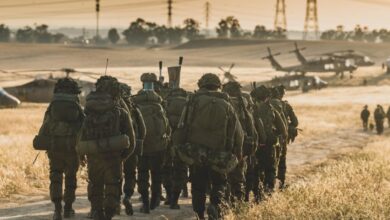Kim Jong-un Demands Escalation of Missile Production, Issues Stark Warning of Preparedness for Conflict

Kim Jong-un Demands Escalation of Missile Production, Issues Stark Warning of Preparedness for Conflict
In a recent development that has sent shockwaves through the international community, North Korean leader Kim Jong-un has issued a resounding directive to increase the production of missiles, accompanied by a stern message of readiness for potential hostilities. The move comes as tensions rise, raising concerns about the stability of the region and the potential global ramifications of such a decision.
In a televised address, Kim Jong-un emphasized the urgency of bolstering the country’s missile capabilities, stating that North Korea must be “fully prepared for any eventuality.” The rhetoric employed by the leader has led to growing apprehension, as the international community grapples with the implications of these statements.
The announcement has prompted swift responses from neighboring nations, with South Korea expressing deep concern over the escalation of tensions. Japanese Prime Minister, Aiko Yoshida, expressed her nation’s condemnation of North Korea’s decision, calling for a peaceful resolution to the rising tensions. The United States, a longstanding regional ally, has echoed these sentiments, urging North Korea to return to diplomatic negotiations.

The announcement from Pyongyang has fueled speculation about the motivations behind this move. Analysts and experts suggest that the decision may be a strategic maneuver to gain leverage in future negotiations with the international community. Others view it as an attempt to solidify Kim Jong-un’s domestic position and demonstrate strength in the face of economic challenges and a changing geopolitical landscape.
China, a key player in the region, has called for restraint and a return to diplomatic channels. Chinese Foreign Ministry spokesperson Li Wei stated that a peaceful resolution is of paramount importance for regional stability. China’s close ties with North Korea afford it a unique position to influence and engage with the reclusive state.

As tensions escalate, it is crucial to understand the historical context of North Korea’s actions. The nation has a history of utilizing provocative rhetoric and displays of military strength as bargaining tools in negotiations with the international community. The 1950-1953 Korean War, which ended in an armistice rather than a formal peace treaty, has left the Korean Peninsula divided and technically still at war.
While the situation is undoubtedly tense, diplomatic avenues for resolution remain open. The international community has previously engaged in dialogue with North Korea to curb its nuclear ambitions, leading to periods of relative calm. The Six-Party Talks, involving North Korea, South Korea, China, Japan, Russia, and the United States, were instrumental in addressing regional security concerns. Though the talks have faced setbacks, they stand as a testament to the potential of diplomatic engagement.
In recent years, there have been sporadic attempts to restart dialogue with North Korea. The 2018 Singapore Summit between Kim Jong-un and then-U.S. President Donald Trump marked a historic meeting that raised hopes for denuclearization and peace. While the summit yielded a vague declaration of intent, subsequent negotiations faltered, leading to an impasse. The current escalation underscores the need for sustained and meaningful dialogue to avert a catastrophic outcome.

Global leaders and organizations have unanimously called for a de-escalation of tensions and a return to the negotiating table. The United Nations Secretary-General, in a statement, urged all parties involved to exercise restraint and prioritize peaceful resolutions. The international community’s resolve to prevent conflict in the region is unwavering, and efforts are being made to convene emergency meetings to address the crisis.
The implications of a potential conflict on the Korean Peninsula are profound and far-reaching. The densely populated region is home to major economic powerhouses, including South Korea and Japan, both of which play crucial roles in global trade and commerce. The disruption caused by any military action could reverberate across the world, affecting financial markets, trade routes, and geopolitical alliances.
In the face of escalating tensions, it is essential for all parties to remain committed to dialogue and peaceful solutions. The lessons of history underscore the destructive nature of armed conflict and the need for diplomatic efforts to avert catastrophe. The situation demands clear communication, measured responses, and a steadfast commitment to resolving differences through negotiation.
As the international community closely monitors the situation, it is a reminder that even in times of heightened tension, diplomacy remains the most viable path to peace. The world’s collective hope rests on the leaders involved finding common ground and charting a course that ensures stability, security, and prosperity for all.
In conclusion, Kim Jong-un’s directive to increase missile production and readiness for conflict has sparked alarm across the globe. The international community’s response underscores the shared commitment to avoiding conflict and pursuing peaceful solutions. As diplomatic efforts intensify, the world watches with bated breath, hoping that reason and dialogue will prevail in this critical juncture of global security.






